Luminous Audio’s Axiom II Passive Pre with Walker Mod
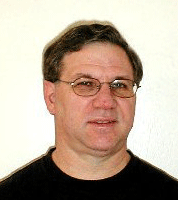
Luminous Audio Technology (LAT) is one of those small American companies that endeavors to offer the consumer very high value for the dollar spent. They use the best parts and materials they can find to fit into the budgets of almost any audiophile. Costs are kept down by offering their goods at less than the usual mark up and them selling them factory direct.
Luminous Audio began life in 1988 as a Dynaco modification outfit in the converted attic of a house that LAT’s founder and CEO Tim Stinson was renting at the time. The following paragraph is a quote from an e-mail correspondence I received from Tim:
“I have 17 dyna Pas-3’s in the world somewhere and god knows how many Mk-III’s and ST-70’s etc. repaired and with minor mods. I attended my first CES in 1991 and decided the world needed interconnect cables that made sense that were not $1,000. I started the cable division with about $1,000 cash. Crazy! It grew very slowly until the Allegro digital cable was reviewed by Bound for Sound around 1994 as the second best he (Martin DeWulf) had ever heard, period. The Allegro was $79 at the time when his reference was $800. Suffice it to say that we sold them as fast as we could make them for several months and this put us on the map. The Stereo Times review on the Synchestra Signature audio cables topped things off in the late 90’s.”
I first met LAT’s Tim Stinson, in the early 90’s, when I was the President of the New Jersey Audio Society and Tim had cables to demonstrate. I recall liking LAT’s early Monarch interconnects and Prestige speaker cables well enough to keep them in my system for quite some time. In fact, I’m still using a few pairs of the original Monarch interconnects that I bought from Tim at least 15 years ago… and Luminous Audio currently offers the Mk-II versions of both cables.
In addition to its many cable offerings, Luminous Audio is currently marketing a purist line of passive preamplifiers under the moniker “Axiom II,” and the ad copy I saw was making a claim that “the basic $199 Axiom II will equal or surpass any other passive preamp up to $2,500, or your money back.” And that got me thinking, especially since I had another manufacturer’s $2,500 transformer-based passive in my system at that time.
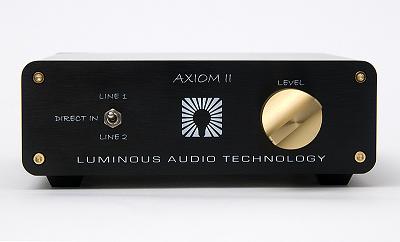
A plethora of options and upgrades is available for the basic Axiom II. Among them are extra inputs and outputs, different grades of resistors for the 1% tolerance Polish-made resistive series volume control, and Balanced XLR inputs and outputs instead of the standard RCA type connectors. And as if this were not enough, the company offers a “Walker mod,” that uses premium gold over copper Vampire Wire connectors, high-purity 6/9’s ONO cast copper wiring, Mil-spec rotary silver-contact source selector, and either Holco, Caddock, or Allen Brady carbon series resistors in the signal path. Internal chassis damping and Sorbothane feet complete the Walker mod package.
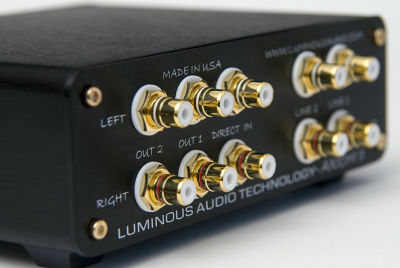
So while we are talking about a basic Axiom II with only one pair of RCA inputs and outputs, and a volume control (no selector switch) for $199, the model I tested with the Walker mod including 3 pairs of RCA inputs and 2 pairs of outputs, plus the Caddock high-quality resistors totaled out at $865 USD. In my view, this Walker-mod Axiom II turned out to be quite the bargain. I should also mention that the “Walker” in “Walker mod” is Thomas Walker—not to be confused with Lloyd Walker, designer of the Proscenium Gold turntable.
Set up
I used the Walker-mod Axiom II in a system that had my Lenovo laptop via the NuForce Icon HD USB DAC, and my Michell Orbe II – Cayin Phono One turntable system as the two sources feeding the Axiom II. The Axiom II in turn fed my modified Dignity Audio 300B mono block amps that powered the 94dB/watt WaveTouch Grand Teton speakers. This worked very well indeed.
To be sure the specific resistors selected for the volume control in the Axiom II would match well with my source, my amps, and my speakers, Luminous Audio requested that I submit several specs on my audio system prior to assembling my particular Axiom II. In other words, designing an excellent resistive passive preamp is not a “one size fits all” affair and I compliment Luminous Audio on their attention to detail and customer satisfaction in this regard.
Let the games commence!
Prior to putting the Walker-mod Axiom II in my system I had another passive preamp on loan that used very expensive Tango transformers and currently has a list price of over $2,500 (USD). The Tango transformers are premium quality and the unit also used an Elma selector with gold contacts and an expensive Elma volume control.
In my estimation, this transformer-based passive preamp was the best performing preamp I had heard in my system up until that point, but when I inserted the Luminous Axiom II, not only were all the strengths of the transformer-based unit preserved, but the focus of the instruments improved… kind of like getting a new pair of eyeglasses for your ears.
The Axiom II throws an expansive holographic soundstage that has remarkable clarity and resolution. And compared to my VTL TL-2.5 active tube line stage the bass on the Axiom is tighter and delves deeper. I kept my output interconnects (to the amps) short to preserve dynamics and in my opinion the dynamic ability of the Axiom II is as good or better than the VTL… and the VTL in no slouch in the dynamics department. The Axiom II also removed the slight bloat from the mid-bass area, which allowed me to hear more midrange and high frequency detail.
I played a lot of hi-res computer files that sounded simply fantastic through the Axiom II. Female vocals are particularly engaging and one can hear the singers taking breaths and even their lips parting. Good digital recordings from the likes of Eva Cassidy and Holly Cole were particularly captivating.
When I moved to LP records I was not disappointed. Although the Axiom II seemed to accentuate record surface noise a bit more than other preamps I’ve used, it was not objectionable.
 On Johnny’ Cash’s CASH album (American Recordings 9 45520-1), Johnny’s voice displayed just the right amount of throaty resonance. And when he sang “Down There by the Train,” I could hear all the tonality, inflection and conviction embodied in his performance. And Cash’s acoustic guitar was crisp and natural. It is quite apropos that with components like the Axiom II Johnny C’s legacy can live on through his many great recordings.
On Johnny’ Cash’s CASH album (American Recordings 9 45520-1), Johnny’s voice displayed just the right amount of throaty resonance. And when he sang “Down There by the Train,” I could hear all the tonality, inflection and conviction embodied in his performance. And Cash’s acoustic guitar was crisp and natural. It is quite apropos that with components like the Axiom II Johnny C’s legacy can live on through his many great recordings.
Returning to the 80’s I broke out the Human League’s 12-inch of “Don’t You Want Me/It Took Seconds” (Virgin Records VS466-12). The Axiom II displayed the great bass dynamics of this 45 rpm 12” disc, especially on “It Took Seconds.” And the bass was as articulate as it was solid. Also, the fake gun-shot percussive bursts had a lot of pop and a generous amount of space and echo around each burst. In addition the lead male vocal was rendered very clearly without any breakup or stridency.
Going to my LP of Igor Stravinsky Conducts 1961 (Columbia MS 6272) showed me the true potential of the Axiom II. It is harder to mistake the sound of real acoustic instruments and using the Axiom II made it all but impossible.
Virtually every instrument from the violins to the flutes, oboes, trumpets and kettle drums sprang to life out of thin air—the same way they do in a live venue.
Playing L’ Histoire du Soldat, the kettle drums had all the tonality and echo inside the drum that one could hope for, and cymbal crashes shimmered effortlessly in the air and contained both the sound of the metal being struck by wood and the shimmering waves of air that resulted.
The real icing on the cake is that the interplay between the various brass, woodwind and stringed instruments became more vivid and engaging. And in fact this increased my musical involvement causing me to listen to the whole record side instead of skipping around as I normally do. All in all, I found the musical performance of the Walker-mod Axiom II to be quite remarkable.
Caveats
The only thing that stands out as a possible area for concern is a slight forwardness in the lower treble region. While this extra presence did provide extra detail and musical nuances, it also seems a bit overdone on my bright sounding recordings. And, as I previously mentioned, it did highlight record surface noise just a bit. Because of this, I used the SignalCable Analog Two interconnects, which tend to be polite in the upper-midrange through lower treble region. This combination worked well in my system.
I am glad I had time to think about my above criticism, because in the meantime I received a new piece of audio gear that has caused me to ponder the “brightness” issue. That component is the new top-of-the-line PS Audio DirectStream D to A converter. And inserted into the same system in place of the much less expensive NuForce Icon HD DAC the lower highs came into a better less-forward and more neutral balance. Yet the upper-frequency treble and air had improved and the instrumental images (even the already-great bass) became more solid and engaging. I am happy to announce that a full review of the PS Audio DirectStream DSD DAC will be coming soon.
Summary
The Luminous Audio Technology Axiom II passive preamplifier with Walker mod opened my eyes to the fact that one doesn’t need to spend mega-bucks on a “High-End” preamplifier in order to get true High End performance. If you pair the Walker/Axiom II with a very good amplifier you will be amazed at the Axiom II’s degree of musicality and the wealth of detail that will ensue.
I am definitely buying the review sample and keeping it as my reference preamplifier in my small-room reference system. My thanks to Tim Stinson and Luminous Audio Technology for keeping High-End sound affordable!


frank alles
Manufacturer
Luminous Audio Technology
1312 N Parham Rd
Richmond, VA 23229
Phone: (804) 741-5826
E-mail: luminous@cavtel.net
Web: http://luminousaudio.com/
Stereo Times Masthead
Publisher/Founder
Clement Perry
Editor
Dave Thomas
Senior Editors
Frank Alles, Mike Girardi, Russell Lichter, Terry London, Moreno Mitchell, Paul Szabady, Bill Wells, Mike Wright, and Stephen Yan,
Current Contributors
David Abramson, Tim Barrall, Dave Allison, Ron Cook, Lewis Dardick, John Hoffman, Dan Secula, Don Shaulis, Greg Simmons, Eric Teh, Greg Voth, Richard Willie, Ed Van Winkle, Rob Dockery, Richard Doron, and Daveed Turek
Site Management Clement Perry
Ad Designer: Martin Perry


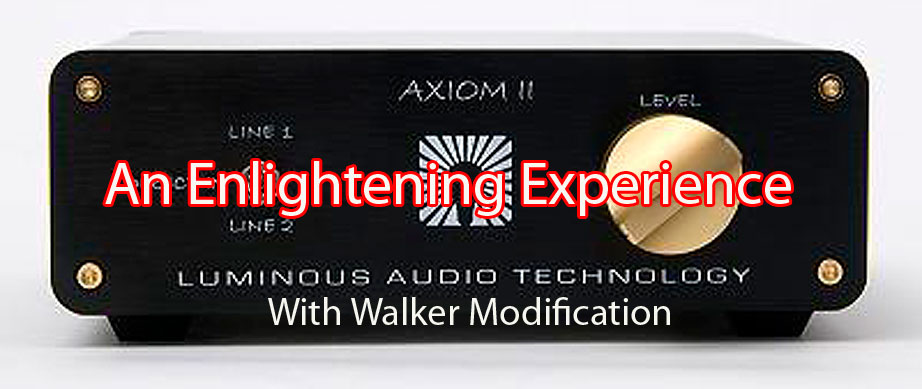
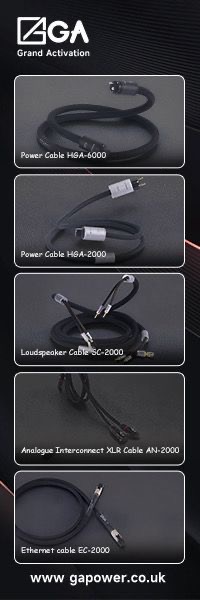
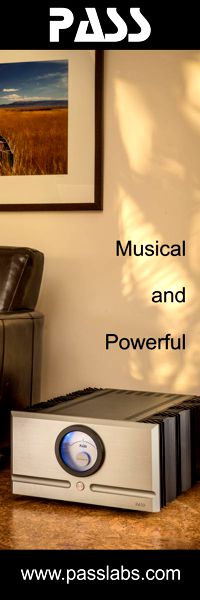
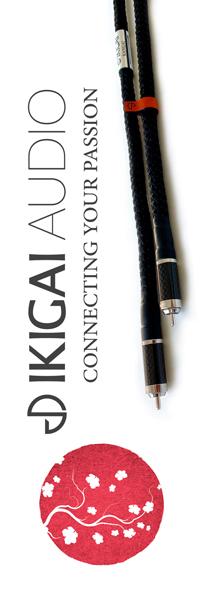
Be the first to comment on: Luminous Audio’s Axiom II Passive Pre with Walker Mod